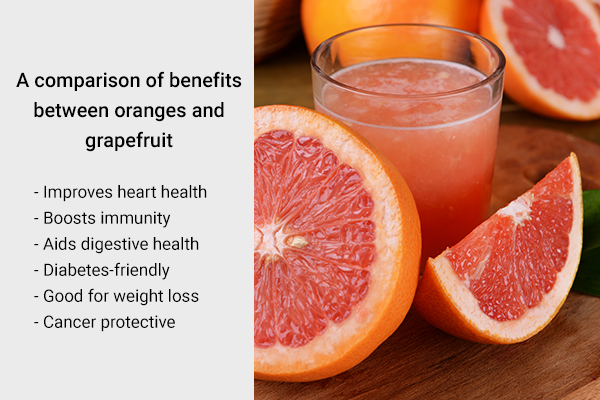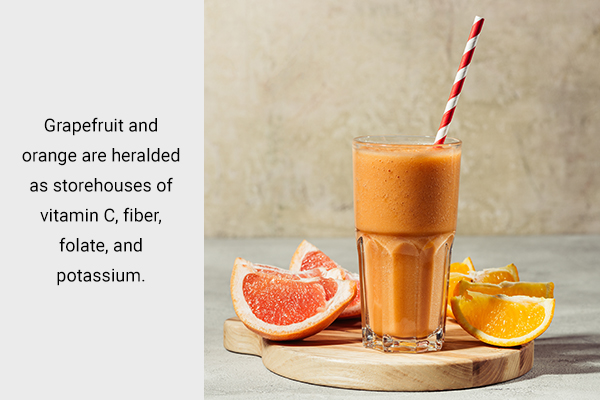In this article:
While there are some differences in the nutritional values of grapefruit and oranges, they offer similar health benefits but to varying degrees. Your choice of consuming orange or grapefruit can depend on the following comparisons.

Oranges are richer in vitamin C, whereas grapefruit contains a much higher concentration of vitamin A. When it comes to minerals, oranges contain more folate, copper, and potassium, whereas grapefruit is higher in beta-carotene.
Though oranges are the most popular of the citrus group, other members of the group including grapefruit, kumquat, and pomelo offer unique benefits as well. (1)
Of all the many fruits in the citrus group, oranges and grapefruit look the most similar and are more widely consumed.
A Comparison of Benefits
Here is a comparative analysis of the benefits offered by orange and grapefruit consumption.

1. Improved heart health
Citrus fruits contain vitamin C, folate, carotenoids, potassium, and fiber, and these compounds can offer protection against heart diseases that include hypertension and atherosclerosis (formation of fatty plaques in the blood vessels), which increase the risk of heart attacks and deaths.
Multiple studies have found frequent intake of citrus fruits to reduce deaths associated with heart diseases in both men and women. (2)
In a study, half a glass of daily orange juice intake was found effective in reducing total cholesterol and LDL (bad cholesterol) levels. (3)
Grapefruit, due to its polyphenol naringin, also offers protection from the formation of atherosclerosis. (4)
Vitamin C, in particular, has been found highly potent in reducing the risk of heart diseases, (5) and grapefruit consumption was also found to reduce levels of triglycerides and cholesterol and improve HDL (good cholesterol) levels. (6)
In a more recent study, grapefruit was found to have a vasculoprotective effect in postmenopausal women. Due to its rich polyphenol profile that includes naringin and narirutin, grapefruit was effective in reducing inflammation in the blood vessels and further in reducing the risk of heart diseases. (7)
Therefore, both oranges and grapefruit can be consumed for optimal heart health.
2. Boosts immunity
When it comes to immunity, oranges may be a better choice than grapefruit purely because of the former’s much higher vitamin C content. (8)
Vitamin C aids in protecting the body from infections by increasing the activity of immune cells that are involved in killing disease-causing microorganisms that have entered the body. (9)
In addition to vitamin C, oranges also contain polyphenols also present in grapefruit such as hesperidin, narirutin, and naringin, which were found to reduce inflammation following a high-carbohydrate or high-fat meal. (10)
It can be concluded that oranges are likely to offer a higher immune-boosting benefits.
Studies are currently underway to identify the antiviral role orange juice consumption can play.
3. Aids digestive health
Oranges and grapefruit contain two essential components to maintaining a healthy bowel function: water and fiber. Drinking less water is often the prime reason for developing constipation. (11)
Most Americans are said to consume less than half the recommended intake (between 25–38 g/d depending on age) of fiber every day.
Adequate fiber intake not only adds volume to the stool but also absorbs water, making the stool soft. This, in turn, prevents constipation and reduces the strain on the colon. (12)
Other benefits of consuming fiber include: (12)
- Preventing colon cancer
- Reducing cholesterol levels
- Preventing spikes in blood sugar after meals
- Increasing satiety, which prevents the risk of overeating and ultimately aids in weight loss
- Preventing cancer
- Reducing the risk of type 2 diabetes, heart disease, and stroke
- Improving immunity
While oranges and grapefruit both have comparable amounts of fiber, oranges seem to have a little more per serving. It’s important to note that eating whole oranges is better than consuming the juice.
4. Aids in diabetes management
Even though oranges and grapefruit have a sweet taste, their high fiber and water content make them suitable snacks for people with type 2 diabetes.
In fact, the American Diabetes Association recommends a serving of citrus fruits including oranges and grapefruit to add to the daily requirement of fiber, vitamin C, fiber, folate, and potassium. (13)
When compared, grapefruit has a lower glycemic index of 22 than oranges with 35. This means it is less likely to spike blood sugar levels after consumption. (14)
In addition, grapefruit was beneficial in lowering insulin spikes after meals in a study. The group consuming fresh grapefruit also saw a modest weight reduction at the end of the 12-week program. (15)
In another study comparing orange juice and grapefruit juice, the latter was more effective in improving insulin activity and reducing blood sugar levels. (16)
5. Aids weight loss
Oranges and grapefruit can be excellent additions to a weight loss diet. With their high water and fiber content, both can increase satiety levels and prevent the risk of overeating.
Grapefruit, in particular, has a more significant role to play in reducing total body weight. One study found that simply half a grapefruit before meals was effective in reducing some weight, reducing waist circumference, and lowering blood pressure at the end of a 6-week period. (17)
6. May protect against cancer
Citrus fruits, in general, have been associated with a reduced risk of cancer including esophageal cancer and breast cancer. (18)(19) The current information awards this benefit to their vitamin C content, which is responsible for killing cancer cells and preventing their growth. (18)
One study revealed that a particular flavonoid present in grapefruit called bergamottin was particularly useful in reducing the risk of prostate cancer by preventing cancer cells from multiplying. (20) Both oranges and grapefruit can be used to protect yourself from the risk of cancer.
Grapefruit and Its Nutritional Profile
Grapefruit is considered a hybrid fruit, obtained from cross-breeding pomelo and sweet orange. It has several varieties in terms of color. Grapefruit can be white fleshed, pink fleshed, or red fleshed, with the ruby red variant being the most commonly consumed. (21)
Grapefruit is fairly large and is often eaten in servings of half a fruit at a time. With 65 calories, 2.5 g of fiber, 11 g of sugar, and 135.6 g of water, half a grapefruit also contains: (22)
- 89.3 mcg of vitamin A (10% of the daily requirement)
- 1056.4 mcg of beta carotene
- 48 mg of vitamin C (53% of the daily requirement)
- 20 mcg of folate (5% of the daily requirement)
- 6% of the daily requirement of copper
- 4% of the daily requirement of potassium
Orange and Its Nutritional Profile
Just like grapefruit, oranges are also considered a hybrid fruit. Breeding pomelo and mandarin yields the oranges that are so loved and well consumed today.
The juice of an orange is the most popularly consumed fruit juice, and the whole fruit is generally eaten in a single serving. (23)
One serving of orange (1 whole fruit) offers 72 calories, 3.7 g of fiber, 14 g of sugar, and 134 g of water. It also contains: (8)
- 17 mcg of vitamin A (2% of the daily requirement)
- 109.3 mcg of beta carotene
- 82 mg of vitamin C (91% of the daily requirement)
- 46 mcg of folate (12% of the daily requirement)
- 8% of the daily requirement of copper
- 6% of the daily requirement of potassium
Precautions With Grapefruit

Grapefruit is particularly contraindicated with medication specifically prescribed for heart diseases. Some of its effects include: (21)
- Interactions with medications prescribed for lowering high blood pressure (angiotensin receptor blocker), reduce their efficacy.
- Interference with medications prescribed for arrhythmia or irregular heartbeat.
- Interaction with calcium channel blockers (medications for lowering blood pressure), causing an increased pulse rate and extremely low blood pressure.
- Reduces the activity of an intestinal enzyme that is responsible for metabolizing drugs and toxins to remove them from the body. Since patients with liver diseases are more dependent on this enzyme for drug clearance, they should particularly avoid grapefruit.
Most-Asked Questions
Who should avoid grapefruit or orange juice?
People with a general citrus fruit allergy should avoid orange and grapefruit and their juices.
Does grapefruit increase the risk of breast cancer?
An older study in 2007 reported an increased risk of breast cancer in women who consumed a quarter of the fruit daily. However, subsequent studies found no relationship between the two.
Experts at the American Institute for Cancer Research suggest intake of grapefruit for its high vitamin C and folate content but also advise women to limit consumption if they are doubtful. (24)
Practical Takeaways

- Grapefruit and orange are heralded as storehouses of vitamin C, fiber, folate, and potassium.
- Both fruits offer health benefits such as protection from heart diseases, reduction of atherosclerosis, improvement of digestive health, lowering some amount of weight, boosting immunity, managing type 2 diabetes, and reducing the risk of cancer.
- People with a general citrus allergy need to avoid grapefruit and orange consumption.
- Was this article helpful?
- YES, THANKS!NOT REALLY


